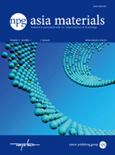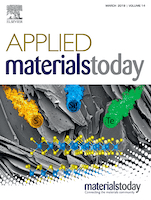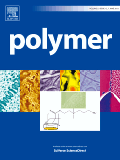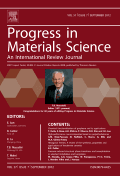
Materials Today Advances
Scope & Guideline
Championing high-impact contributions in materials innovation.
Introduction
Aims and Scopes
- Advanced Material Synthesis and Characterization:
Research on novel methods for synthesizing and characterizing advanced materials, including nanomaterials, composites, and 2D materials, which play a crucial role in enhancing material performance. - Materials for Energy Applications:
Focus on materials designed for energy production and storage, such as batteries, supercapacitors, and solar cells, aiming to improve efficiency and sustainability. - Biomaterials and Medical Applications:
Exploration of materials used in medical applications, including drug delivery systems, tissue engineering, and diagnostics, emphasizing their biocompatibility and effectiveness. - Smart and Functional Materials:
Investigation of materials that respond dynamically to environmental stimuli, such as hydrogels and shape-memory polymers, which have broad applications in robotics and adaptive systems. - Environmental and Sustainable Materials:
Research on materials that contribute to sustainability, including biodegradable polymers and environmentally friendly manufacturing processes, aimed at reducing ecological impact. - Computational Materials Science:
Utilization of computational techniques to predict material properties and behaviors, facilitating the design of new materials and improving existing ones.
Trending and Emerging
- Additive Manufacturing and 3D Printing:
There is a growing interest in additive manufacturing techniques, including the development of new materials and methods for 3D printing, which are revolutionizing production processes in various industries. - Nanotechnology and Nanomaterials:
The use of nanomaterials is on the rise, particularly in applications related to drug delivery, electronics, and energy storage, due to their unique properties and potential to improve performance. - Machine Learning and Data-Driven Materials Design:
The integration of machine learning approaches in materials science is trending, facilitating accelerated discovery and optimization of new materials through computational techniques. - Biomimetic and Bioinspired Materials:
Research focusing on materials inspired by biological systems is gaining momentum, particularly for applications in medicine and materials engineering, enhancing functionality and performance. - Smart Textiles and Wearable Technologies:
Emerging themes include the development of smart textiles that integrate electronic functionalities for health monitoring and environmental sensing, reflecting a convergence of materials science and consumer technology.
Declining or Waning
- Traditional Metal Alloys:
Research on conventional metal alloys is becoming less prominent as focus shifts towards advanced materials such as high-entropy alloys and composites, which offer superior properties and performance. - Basic Polymer Studies:
General studies of polymer chemistry and physics are declining as the field moves towards more application-driven research, such as smart polymers and biopolymers with specific functionalities. - Static Functional Materials:
The exploration of static materials with fixed properties is waning in favor of dynamic and responsive materials that can adapt to their environments, reflecting a broader trend towards multifunctionality. - Non-Eco-Friendly Materials:
Research on traditional materials that do not consider environmental impacts is decreasing, as sustainability becomes a key factor in materials development.
Similar Journals

Accounts of Materials Research
Exploring innovative pathways in materials research.Accounts of Materials Research is a premier journal published by the American Chemical Society, focusing on the multidimensional field of materials science. With a robust impact factor and a commitment to open-access research, it serves as a vital platform for leading-edge discoveries from 2020 to 2024. The journal has rapidly ascended to the top quartile in multiple categories, including Chemical Engineering, Materials Chemistry, and Polymers and Plastics, demonstrating its significant influence within the academic community. Recognized by Scopus as a key resource—with remarkable rankings that place it in the 95th percentile of its field—Accounts of Materials Research is devoted to publishing high-quality, innovative research that addresses critical challenges in materials development and implementation. This journal is essential for researchers, professionals, and students seeking to stay informed about the latest advancements and collaborative opportunities within the interdisciplinary landscape of materials science.

NPG Asia Materials
Elevating the Discourse on Material Properties and InnovationsNPG Asia Materials, a premier journal published by NATURE PORTFOLIO, stands at the forefront of research in the fields of condensed matter physics, materials science, and modeling and simulation. With an impressive Impact Factor gracing its Q1 rankings in 2023, this open-access journal, established in 2012, offers a vital platform for disseminating high-quality research articles, reviews, and perspectives that advance the understanding of material properties and innovative applications. Based in the United States and catering to a global audience, NPG Asia Materials features cutting-edge contributions that not only enhance academic scholarship but also provoke discussions relevant to both industry and academia. Researchers, professionals, and students are invited to explore its extensive archive of work, covering insights from 2009 to 2024, in a bid to stay abreast of the latest developments in these rapidly evolving scientific domains.

Applied Materials Today
Transforming Research into Real-World Solutions.Applied Materials Today is a leading peer-reviewed journal published by ELSEVIER, dedicated to the field of materials science. With an impressive impact factor and ranked in the Q1 category for materials science (miscellaneous) in 2023, this journal stands out as a crucial platform for sharing groundbreaking research and innovative applications of materials. Based in the Netherlands, the journal has rapidly gained recognition, achieving a remarkable Scopus ranking of 41 out of 463, placing it in the 91st percentile among general materials science publications. Covering a broad range of topics, from the synthesis and characterization of materials to their practical applications, Applied Materials Today seeks to inspire and inform researchers, professionals, and students alike. Its commitment to disseminating high-quality, open-access content ensures that cutting-edge discoveries in materials science can be shared with a global audience, fostering collaboration and advancements in the field.

Frontiers in Materials
Connecting Researchers to Shape Tomorrow's Materials.Frontiers in Materials, an esteemed journal published by FRONTIERS MEDIA SA, is a leading platform in the field of Materials Science, with a notable impact factor placing it in the Q2 category of its discipline as of 2023. Since its establishment as an Open Access journal in 2014, it has fostered considerable academic exchange, allowing researchers from around the globe to share their innovative findings and insights. Based in Lausanne, Switzerland, this journal not only emphasizes high-quality peer-reviewed articles but also prioritizes rapid dissemination of research, as evidenced by its commendable Scopus ranking of #62 out of 196 in Materials Science (miscellaneous). By consistently striving to bridge the gap between academia and practical applications, Frontiers in Materials serves as an invaluable resource for researchers, professionals, and students seeking to delve into cutting-edge advancements and transformative applications in materials science.

Polymer-Plastics Technology and Materials
Fostering Knowledge in Cutting-Edge Materials SciencePolymer-Plastics Technology and Materials is a premier academic journal published by Taylor & Francis Inc., dedicated to the dynamic fields of chemical engineering, materials chemistry, and polymers and plastics. With an impact factor that reinforces its reputation, this journal is strategically indexed in Scopus, ranked notably within its categories (Q2), showcasing its influence and relevance in the academic community. Since its inception in 2019, the journal has served as an essential platform for researchers, professionals, and students to disseminate innovative studies and advancements in polymer science and materials technology. As an Open Access publication, it ensures that cutting-edge research is accessible to a global audience, fostering collaboration and knowledge sharing in the material sciences. Located in the United Kingdom, Polymer-Plastics Technology and Materials continues to enhance the dialogue within the industry, addressing critical challenges and exploring emerging trends that shape the future of polymer and plastics technologies.

Polymer Reviews
Advancing the frontiers of polymer science.Polymer Reviews, published by Taylor & Francis Inc, is an esteemed journal dedicated to the intricate and evolving field of polymer science. With its ISSN 1558-3724 and E-ISSN 1558-3716, the journal has established a significant presence among researchers and practitioners alike, evidenced by its impressive categorization in the Q1 quartiles across multiple disciplines, including Biomedical Engineering, Materials Chemistry, and Renewable Energy. Since its inception in 2006 and continuing through 2024, Polymer Reviews has consistently aimed to advance the knowledge base of polymer applications and innovations, providing a platform for comprehensive review articles that stimulate further research and inspire practical solutions. The journal, ranking within the top percentile across several Scopus categories, underscores its impact and relevance in a rapidly developing scientific landscape. Though not an open-access journal, it remains a vital resource for those invested in the future of materials science and engineering.

POLYMER
Connecting Scholars through Cutting-edge Polymer SciencePOLYMER, an esteemed journal published by Elsevier Science Ltd, stands at the forefront of polymer science, presenting cutting-edge research that encompasses the realms of Materials Chemistry, Organic Chemistry, and Polymers and Plastics. With a remarkable impact factor reflecting its significance in the academic community, POLYMER has been a vital resource since its inception in 1960, contributing to a converged body of knowledge through to 2024. Rated Q1 in all relevant categories as of 2023, and boasting impressive Scopus rankings, this journal not only facilitates advanced discussions in polymer synthesis, characterization, and applications but also serves as a critical platform for collaborative research among scholars, professionals, and students. While it offers content primarily via subscription, POLYMER remains dedicated to fostering innovation and excellence in the field, making it an essential read for anyone passionate about polymer science.

ADVANCED MATERIALS
Pioneering Innovations in Materials ScienceAdvanced Materials, published by Wiley-VCH Verlag GmbH, is a premier academic journal that serves as a crucial platform for cutting-edge research in the field of materials science and engineering. With an impressive impact factor and ranking among the top tiers in various categories, including Materials Science, Mechanical Engineering, and Nanoscience, this journal is recognized for its high-quality contributions and relevance to contemporary research challenges. Spanning from 1989 to 2024, Advanced Materials not only features groundbreaking studies but also provides insights into innovative applications and advancements in material design and engineering. Researchers, professionals, and students alike will benefit from the rigorous peer-review process and diverse range of topics covered, making it an indispensable resource for those aiming to stay at the forefront of materials science innovation.

Advanced Materials Technologies
Pioneering Innovations in Material ScienceAdvanced Materials Technologies is a leading scholarly journal published by WILEY, dedicated to the rapidly evolving fields of materials science and engineering. With an impressive 2023 impact factor reflected in its Q1 ranking in Industrial and Manufacturing Engineering, Mechanics of Materials, and a notable position within the materials science community, this journal stands as a premier platform for disseminating innovative research and technological advances. The journal encompasses a diverse range of topics, from the fabrication and characterization of advanced materials to their applications in various industries, thus fostering interdisciplinary collaboration among researchers, professionals, and students. Since its inception in 2016 and looking forward to 2024, Advanced Materials Technologies continues to provide unparalleled access to high-quality, peer-reviewed articles, ensuring that it remains a vital resource for anyone involved in the design and optimization of advanced materials.

PROGRESS IN MATERIALS SCIENCE
Leading the Charge in Materials AdvancementPROGRESS IN MATERIALS SCIENCE is an esteemed peer-reviewed journal published by Pergamon-Elsevier Science Ltd, focusing on pioneering advancements and comprehensive studies in the field of Materials Science. With an ISSN of 0079-6425 and an E-ISSN of 1873-2208, this journal boasts a prestigious status, ranking in the Q1 category for Materials Science (miscellaneous) and achieving a remarkable 99th percentile in Scopus rankings, positioned 4th out of 463 journals in General Materials Science. Published from the United Kingdom, PROGRESS IN MATERIALS SCIENCE provides critical insights into the latest discoveries, trends, and methodologies shaping the materials science landscape, making it an invaluable resource for researchers, professionals, and students alike. Readers can explore rich content on subjects ranging from nanomaterials to biomaterials and beyond, all designed to foster innovation and knowledge dissemination in the materials science community. Although it is not an open-access journal, it remains a pivotal platform for high-quality research and essential discourse in this dynamic field.